George Floyd: Derek Chauvin trial finds former officer guilty
- Published
- comments
WATCH: Find out more about the case and verdict
A very important trial, which has been going on in America for the last three weeks, has come to an end.
It's after a jury found white ex-police officer, Derek Chauvin, guilty of killing a black man called George Floyd in the US.
George Floyd died while in police custody in May 2020.
Mr Chauvin has now been found guilty on all three charges he was accused of: second-degree murder, third-degree murder and second-degree manslaughter.
He will remain in custody until he is sentenced and could spend decades in jail.
What happened to George Floyd?
George Floyd: Newsround special programme on US protests and racism
George Floyd was an African-American man who died in police custody on 25 May 2020 in the city of Minneapolis in Minnesota.
He was stopped by officers who said he was suspected of using fake money and Derek Chauvin held him down by kneeling on his neck.
Mr Floyd told the officers he couldn't breathe, but he wasn't released and he died shortly after.
His death sparked protests against racism and excessive use of police force all over the world, including the UK.
Four police officers lost their jobs following the incident including Derek Chauvin. The three other officers involved also faced criminal charges.
Derek Chauvin's trial, which lots of people around the world have been following closely, began on 29 March and the jury gave its verdict on 20 April.
What is the jury and what did they have to do?
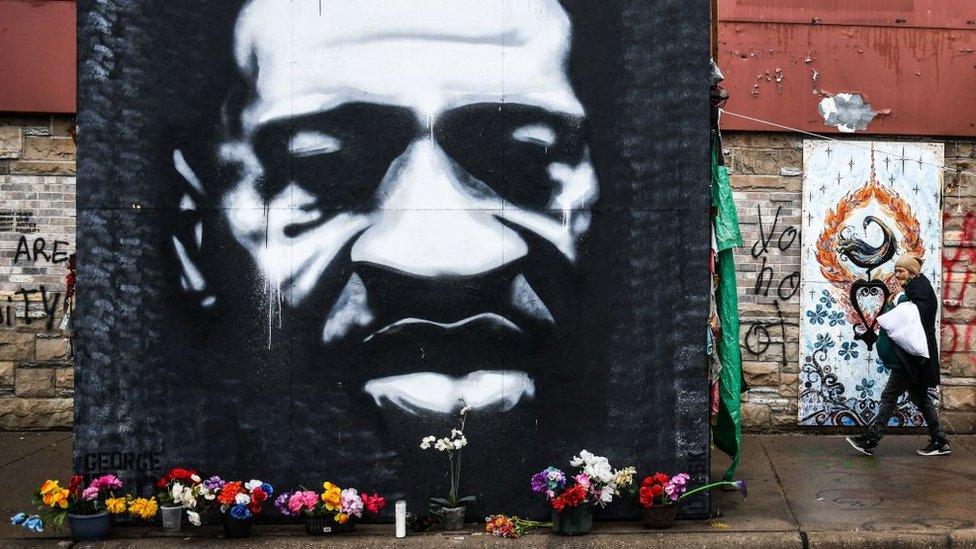
George Floyd died in May last year while he was in police custody
A group of 12 people, known as jurors, were carefully selected for the trial.
They listened to lots of evidence from both the prosecution, whose job it was to prove to the jury that Mr Chauvin was guilty of the crimes he was accused of, and the defence, whose job it was to prove to the jury that he wasn't guilty of the crimes.
After hearing all the evidence and closing statements from both sides, the jurors, who remained anonymous throughout the trial, came together to make a joint decision on whether Derek Chauvin should be convicted of the crimes he'd been charged with and sent to prison.
Jury selection - the 12 members of the jury are chosen by the attorneys.
Opening statements - the attorneys on both sides of the case briefly tell their side of what happened.
Presentation of cases - the main part of the trial, which involves speaking to and hearing from witnesses and looking at evidence.
Objections - the part of the trial where attorneys on both sides can question a piece of evidence presented to the judge.
Closing arguments - this is the last chance the attorneys on both sides get to speak to the jury, and wrap up their evidence.
Jury deliberations and verdict - the members of the jury have time to discuss all of the information they have seen and heard during the trial and make a group decision on whether the defendant is guilty or not guilty.
What were the prosecution's main arguments?
The prosecution's main argument was that former police officer Derek Chauvin used excessive force when he knelt on George Floyd's neck, which led to his death.
Lieutenant Richard Zimmerman, who heads up one of Minneapolis' police departments, testified during the trial. He said Mr Chauvin's actions were "totally unnecessary".
"First of all, pulling him down to the ground facedown and putting your knee on a neck for that amount of time is just uncalled for," he said.
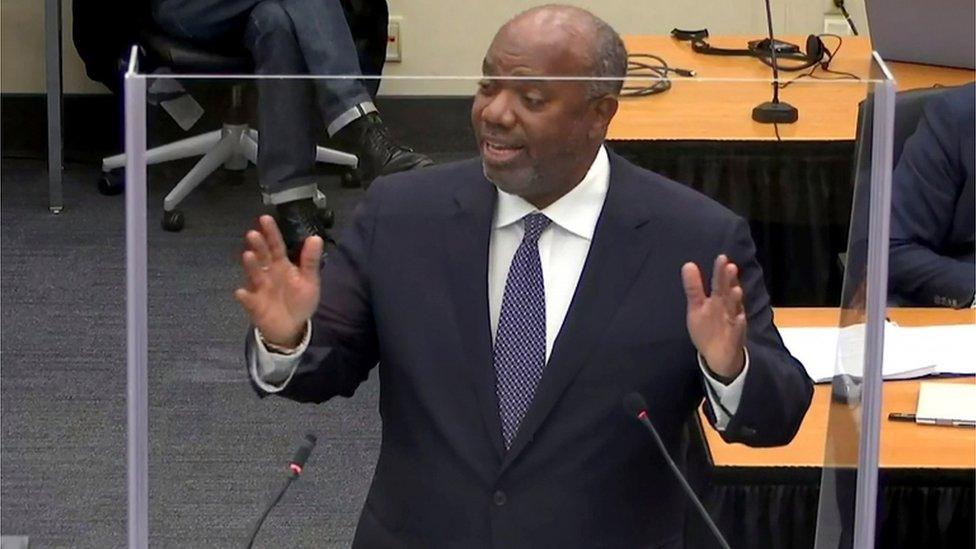
Prosecutor Jerry Blackwell presented arguments to prove to the jury that Derek Chauvin was guilty of the crimes he'd been charged with
"I saw no reason why the officers felt they were in danger, if that's what they felt... and that's what they would have to have felt to be able to use that kind of force."
Lots of other people also gave evidence during the trial including paramedics, bystanders who witnessed the events that took place and Mr Floyd's girlfriend.
And what did the defence argue?
The defence argued that Mr Chauvin's use of force against George Floyd had been justified because he faced an "imminent threat" from the suspect.
Experts who were called upon by Mr Chauvin's legal team, said his behaviour had been in line with the Minneapolis police department's standards.
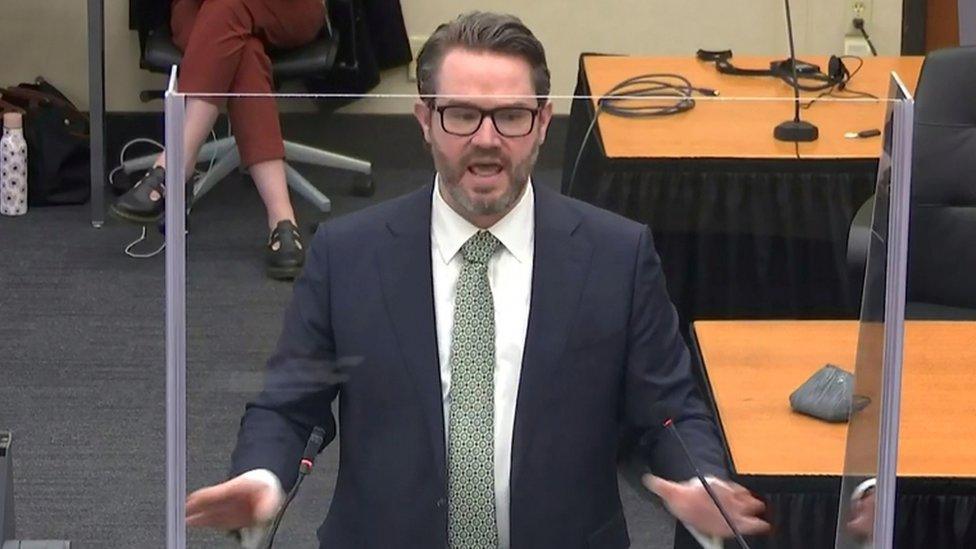
Defence attorney Eric Nelson had to prove to the jury that Derek Chauvin wasn't guilty of the crimes he'd been accused of
"I felt that Derek Chauvin was justified and acting with objective reasonableness following Minneapolis police department policy and current standards of law enforcement in his interaction with George Floyd," said former police officer Barry Brodd.
"It's easy to sit in an office and judge an officer's conduct. It's more of a challenge to put yourself in the officer's shoes, to try to make an evaluation through what they are feeling, what they're sensing, the fear they have, and then make a determination," he added.
Mr Chauvin chose not to give any evidence throughout the trial which experts say is normal in cases like this.
What charges against Derek Chauvin did the jury have to decide on?
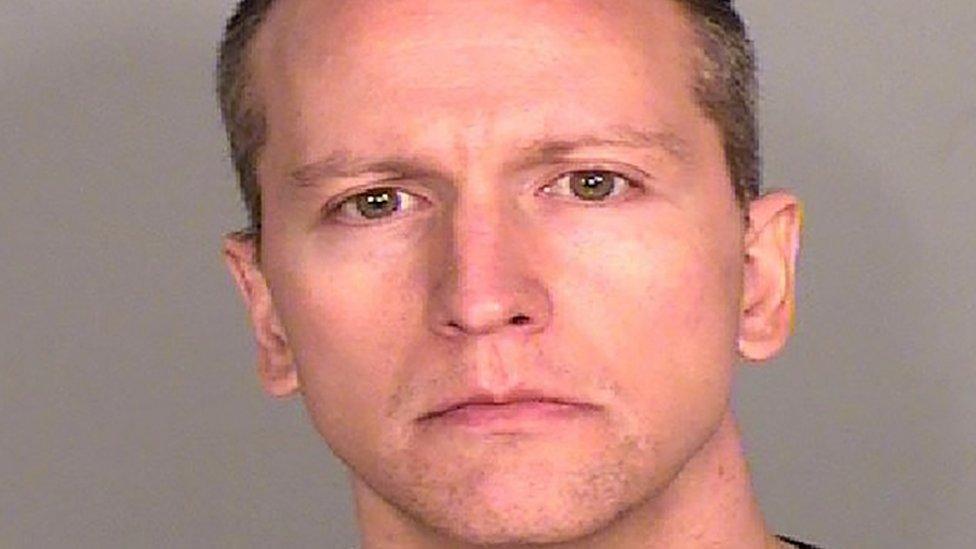
Former US police officer Derek Chauvin
Mr Chauvin was charged with three separate crimes which the jury had to discuss and reach a joint decision on:
Second-degree murder - This is the most serious charge. The prosecutors had to prove to the jury that Mr Chauvin was assaulting Mr Floyd when he caused his death. Mr Chauvin could face up to 40 years in jail after being found guilty on this count.
Third-degree murder - To convict on this charge, the jury had to be convinced that Mr Chauvin showed a reckless disregard or carelessness for human life. This charge carries a maximum sentence of 25 years in prison.
Second-degree manslaughter - For the final charge, the prosecutors had to prove that Mr Chauvin took an "unreasonable risk" when he restrained Mr Floyd, putting him at risk of death or serious harm. With this particular charge, the prosecutors aren't required to prove that Derek Chauvin actually caused Mr Floyd's death. If found guilty of this, someone could face up to 10 years in jail.
What was the final verdict?
Mr Chauvin was found guilty on all three charges: second-degree murder, third-degree murder and second-degree manslaughter.
Sentencing is likely to happen in two months.
However US media is reporting that Mr Chauvin is expected to appeal against the verdict, with the defence team most likely saying that the huge publicity given to the case influenced the jury's decision.
What has the reaction been?
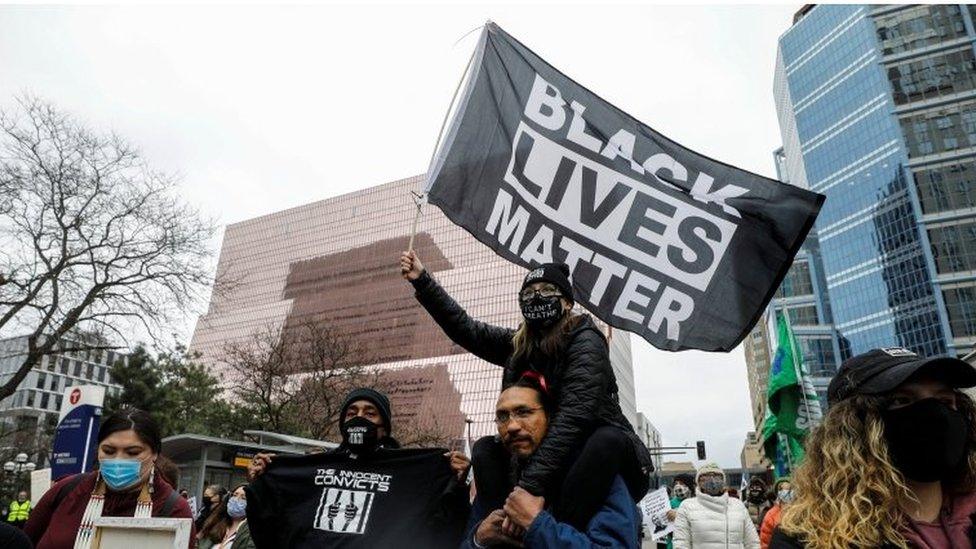
Lots of people had been protesting throughout the trial
Hundreds of people cheered outside the court as the verdict was announced.
Police officers have rarely been convicted in the US - if they are charged at all - for deaths that occur in custody. But this trial's verdict is widely seen as how cases like this may be treated in the future in the US.
The Floyd family's lawyer, Ben Crump, said it marked a "turning point in history" for the US.
US President, Joe Biden, and Vice-President, Kamala Harris, called the Floyd family straight after.
President Biden said: "We're gonna get a lot more done. This is going to be a first shot at dealing with genuine systemic racism."
And on American TV soon after he said: "Systemic racism is a stain on the whole nation's soul."
Kamala Harris urged lawmakers in the US to pass the George Floyd bill which is aimed at reforming policing in the country.
"This bill is part of George Floyd's legacy. This work is long overdue," she said.
- Published3 June 2020
- Published9 June 2020
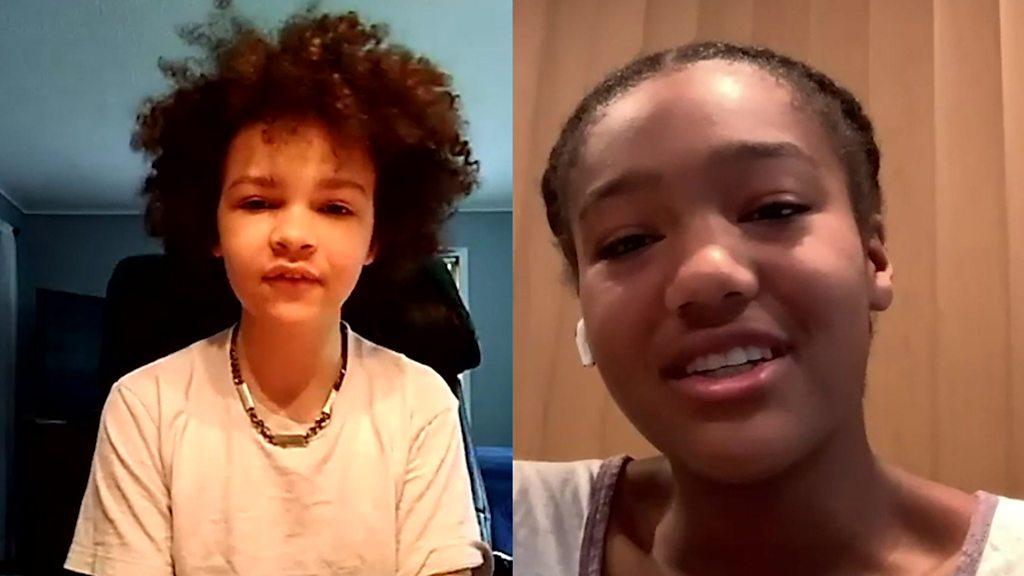
- Published4 June 2020
